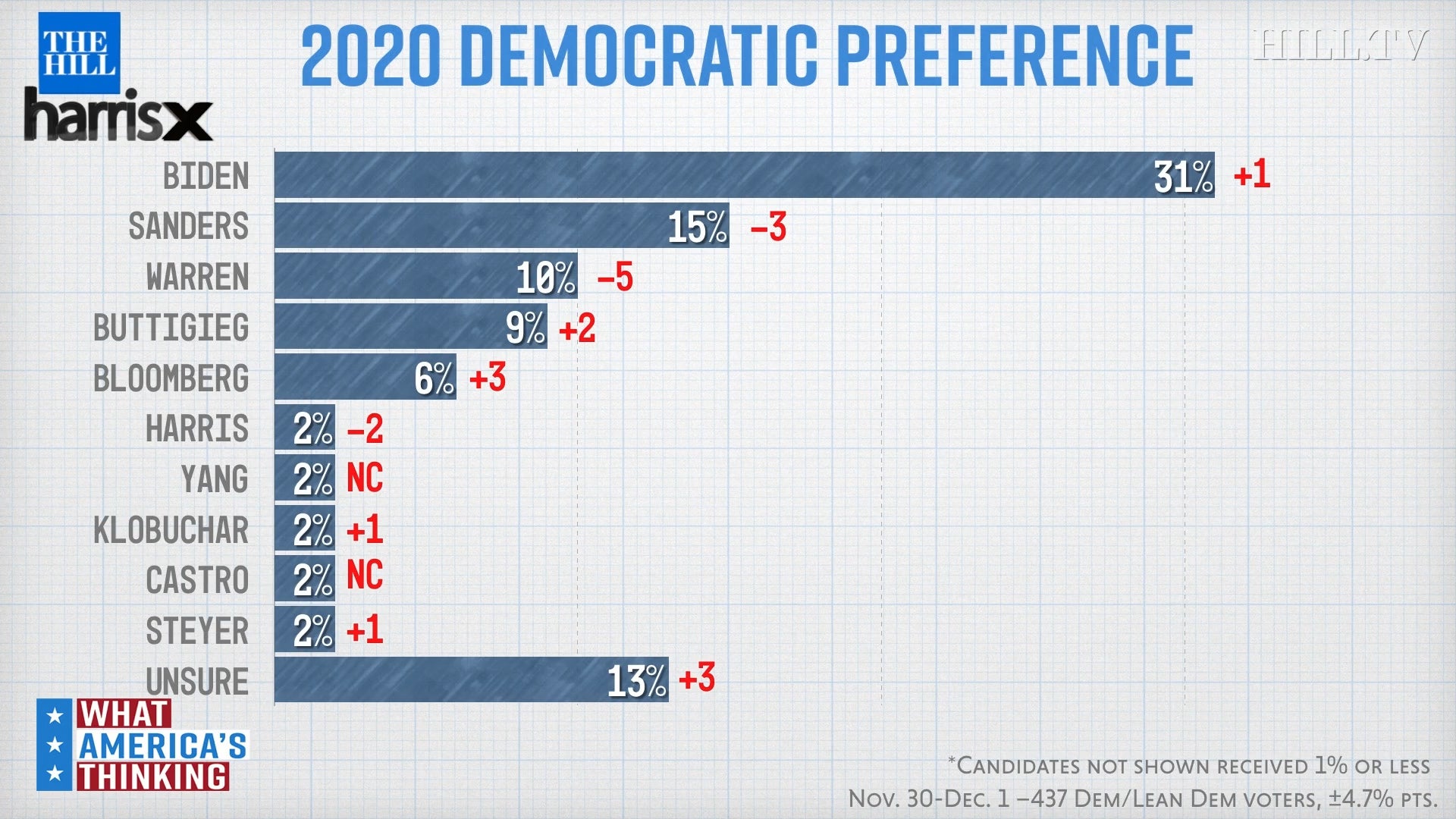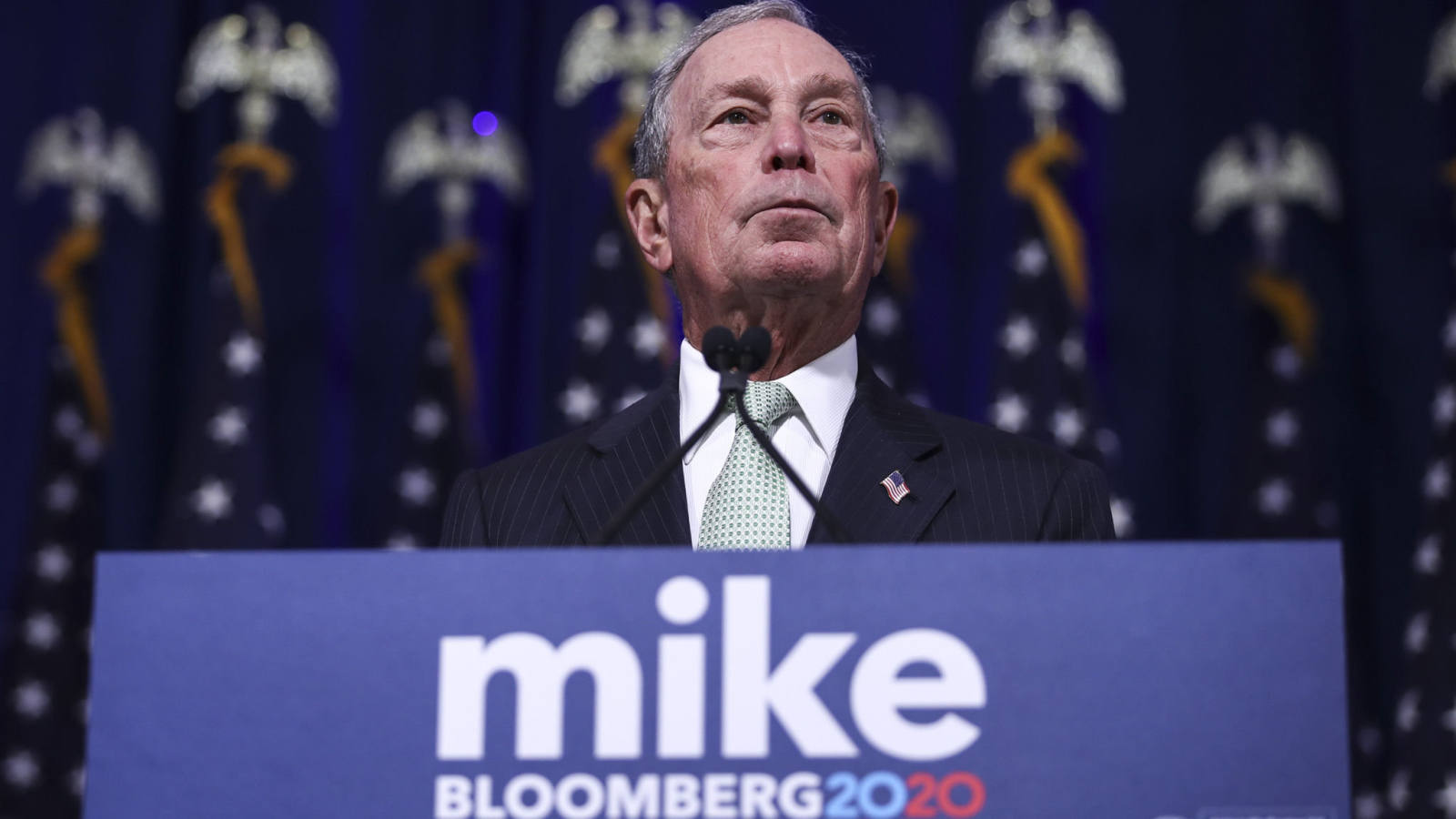Perhaps we’re underestimating the appeal of fresh blood given that we’re eleven months into a primary which remains choppy and unsettled. The process is meant to be choppy, though, and nothing is settled until primary voters start casting votes in February.
However, the horse race seems to be very fluid right now with a new poll showing former New York mayor Michael Bloomberg capturing six percent of Democratic primary voters. On the flip side, in the same poll, Sen. Kamala Harris has hit a new low of just two percent support nationally.
The results come from a polling partnership between The Hill and HarrisX, and give former vice president Joe Biden a handsome lead at thirty-one percent, with Sanders and Warren rounding out the top three:
Former New York City Mayor Michael Bloomberg (D) topped Sen. Kamala Harris (D-Calif.) in a new Hill-HarrisX poll of the Democratic presidential primary race.
The survey released on Monday found that support for the former mayor ticked up from 3 percent to 6 percent among likely Democratic voters and Democratic-leaning independents.
Sen. Kamala Harris (D-Calif.), meanwhile, fell behind with 2 percent support, a two-point decrease.
This marks the first Hill-HarrisX poll that has been taken since Bloomberg officially jumped into the 2020 race, though he was included as a possible candidate in a previous survey.
Here’s the complete breakdown of numbers where you can see who’s gaining and who’s dropping:

The “Unsure” number is something that not every pollster includes. Sometimes they will force poll respondents to at least provide a preference if they had to lean one way or another, or a list of preferences.
Kamala Harris Continues Nosedive
One more poll like this for Kamala Harris and the writing clearly has to be on the wall. We touched on this briefly on Monday but Harris’ campaign seems to be in freefall with senior staffers abandoning ship. The New York Times tried to assess why Harris unraveled so quickly. The answer? Terrible organization of resources, poor morale, and a big helping of nepotism:
Ms. Harris and her closest advisers made flawed decisions about which states to focus on, issues to emphasize and opponents to target, all the while refusing to make difficult personnel choices to impose order on an unwieldy campaign, according to more than 50 current and former campaign staff members and allies, most of whom spoke on condition of anonymity to disclose private conversations and assessments involving the candidate….
She also created an organization with a campaign chairwoman, Maya Harris, who goes unchallenged in part because she is Ms. Harris’s sister, and a manager, Mr. Rodriguez, who could not be replaced without likely triggering the resignations of the candidate’s consulting team. Even at this late date, aides said it’s unclear who’s in charge of the campaign….
But her troubles go beyond staffing and strategy: Her financial predicament is dire. The campaign has not taken a poll or been able to afford TV advertising since September, and it has all but quit buying Facebook ads in the last two months. Her advisers, after months of resistance, have only now signaled their desire for a group of former aides to begin a super PAC to finance an independent political effort on her behalf.
To some Democrats who know Ms. Harris, her struggles indicate larger limitations.
“You can’t run the country if you can’t run your campaign,” said Gil Duran, a former aide to Ms. Harris and other California Democrats who’s now the editorial page editor of the Sacramento Bee.
Running a successful national political campaign is hard, no one would argue with that broad statement. Running a national campaign that has to compete in dozens of early primary and caucus contests is not a job to envy, it’s a daily grind of endless tasks to complete and endless human resource issues finding reliable people to work at the national and state level. In short, setting up a successful campaign is seen as a precursor to setting up a functioning White House should the candidate win.
All of the campaigns have gone through rough patches when it comes to leadership, organization, and strategy questions. Sen. Bernie Sanders, perhaps, has had the most smooth transition into 2020 but that’s in part because he had a functioning apparatus from 2016 to fire back up just a few short years later.
There doesn’t seem to be a way forward for Harris now that she has been coupled to the stench of a losing campaign. Without proper organization in the important early states, much of which should already be in top shape, it will be hard to actually compete. Beyond that, her financial troubles may put an end to things quicker than a poor campaign strategy will.
In the meantime, Bloomberg is making a small splash that may or may not even last past the next few weeks beyond the next Democratic debate.
Donate Now to Support Election Central
- Help defend independent journalism
- Directly support this website and our efforts
